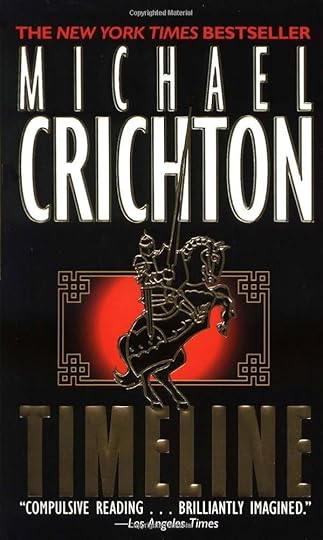[Book Review]: Timeline by Michael Crichton
About the Book

Genre: Science Fiction, Time Travel, Techno-Thriller
Publisher: Arrow Books
Release Date: First published 16th November 1999
In an Arizona desert, a man wanders in a daze, speaking words that make no sense. Within twenty-four hours he is dead, his body swiftly cremated by his only known associates.
Halfway around the world, archaeologists make a shocking discovery at a medieval site. Suddenly they are swept off to the headquarters of a secretive multinational corporation that has developed an astounding technology.
Now, this group is about to get a chance not to study the past but to enter it. And with history opened up to the present, the dead awakened to the living, these men and women will soon find themselves fighting for their very survival — six hundred years ago.
About the Author
 Michael Crichton (1942-2008) was one of the most successful novelists of his generation, admired for his meticulous scientific research and fast-paced narrative. He graduated summa cum laude and earned his MD from Harvard Medical School in 1969. His first novel, Odds On (1966), was written under the pseudonym John Lange and was followed by seven more Lange novels. He also wrote as Michael Douglas and Jeffery Hudson. His novel A Case of Need won the Edgar Award in 1969. Popular throughout the world, he has sold more than 200 million books. His novels have been translated into thirty-eight languages, and thirteen have been made into films.
Michael Crichton (1942-2008) was one of the most successful novelists of his generation, admired for his meticulous scientific research and fast-paced narrative. He graduated summa cum laude and earned his MD from Harvard Medical School in 1969. His first novel, Odds On (1966), was written under the pseudonym John Lange and was followed by seven more Lange novels. He also wrote as Michael Douglas and Jeffery Hudson. His novel A Case of Need won the Edgar Award in 1969. Popular throughout the world, he has sold more than 200 million books. His novels have been translated into thirty-eight languages, and thirteen have been made into films.Michael Crichton died of lymphoma in 2008. He was 66 years old.
My review
4* Stars
Timeline, a fast-paced, heart-racing time travel/techno-thriller, is the second book by Crichton I’ve read. The first one, The State of Fear, didn’t impress me much, but I love the genre and I love Jurassic Park. So I decided to give the author another chance and didn’t regret it. This race-against-time or, better to say, the race-through-time sci-fi novel kept me on the edge of the seat until the last page.
The story of a high-tech corporation, creating a quantum computer, able to transport objects and people to parallel dimensions which, according to the author, look exactlylike ours but in different time periods, immediately drew my attention.
In the centre of the story is a group of history students who excavate a 14th-century monastery in Dordogne Valley, France. Fully funded by ITC, an American tech company, run by a stubborn and controlling billionaire Robert Doniger, the excavation faces many challenges both from the French authorities and their benefactor. When the Head of the Project, Professor Johnston, goes to ITC’s HQ to clarify things and disappears without a trace, his four postgraduates start to suspect foul play. Discovering in the monastery’s ruins a medieval manuscript with the Professor’s handwriting on it, the whole hell breaks loose. Doniger reveals that the Professor travelled back in time of the Hundred Years’ War France to see with his own eyes the site they excavated. He didn’t return. Now, his students need to use their skills and knowledge to save him. Accompanied by two ex-marines, the trio (one of the students decided to stay) travels into the heart of the Hundred Years’ War.
The book is heavy on quantum physics and the history of medieval France. Crichton’s fictional theories of time-space travel sound plausible. At least, for a reader like me who doesn’t understand anything about physics. His description of medieval France is thoroughly researched and detailed, creating a vivid fabric of everyday life in the time of war.
Apart from the Professor, each of the four protagonists has unique motivations, weaknesses, and flaws. Trying to save their leader and survive at the same time, they push their physical and mental abilities to the limit that forges their characters and changes each of them at the end of the story.
The story is full of twists and turns, and the characters hardly have time to breathe between the fights, sieges, and chases. The antagonists, apart from Doniger, are more circumstantial: just knights, monks, peasants, and warlords, living through the tough time of constant war.
Doniger’s motifs for time travel are revealed at the very end of the book which adds yet another twist to the plot.
Through the antagonists of the past and the present, the author discusses such complex topics like capitalism with its corporate greed and the cost of human’s life. It didn’t cost much in the 14th century. Does it cost more in the 20th? Definitely not for such people like Doniger.
Although not completely plot-holes-free, Timeline is an entertaining, enjoyable read. I recommend it to all fans of sci-fi and time travel.
P.S.: This book attracted my attention because the idea of time travel (teleportation through quantum foam) sounds similar to the ideas of time-space travel in my book (Dive Beyond Eternity).
Purchase Link
L. Salt's Blog
- L. Salt's profile
- 139 followers



